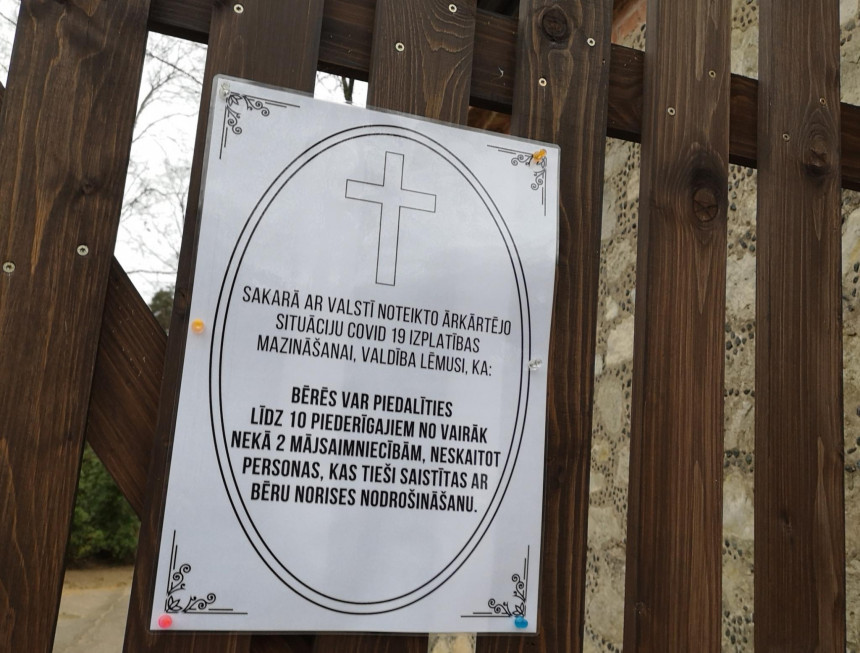Funerals during Covid-19: face masks and frozen pies

Covid and the government's decisions keep public expressions in Latvia in check - not only entertainment but also the funeral process is limited. Only a limited number of people are allowed to accompany a relative or friend for the last goodbye. And no hugs, and no funeral dinner in the cafe.
Restrictive measures affected the funeral ceremonies during the first wave of Covid-19 - only the closest relatives were allowed to say goodbye to the deceased, sometimes precautionary measures even prevented the coffin from being opened before the deceased was laid to rest, especially if the deceased had been diagnosed with Covid-19. With the resurgence of the coronavirus in the autumn, even stricter containment measures affected the funerals, i.e., according to a government decision, no more than 10 people may be outdoors at the funeral, following the two-household principle (excluding those directly involved in the funeral, such as clergy, providers, etc.).
During the past two weeks, Neatkarīgā had to attend two funerals, accompanying relatives to their final resting place.
Quarrel in the making
It is not easy to follow a government order for a limited number of guests at a funeral. Although Latvia does not have such large families as in the southern countries, most of the departed are not without a group of relatives and friends. The relative who has undertaken organizing a funeral is now often faced with a dilemma - who to invite to the funeral and who not to. If you invite only one relative, others will be offended. In order to follow the principle of two households, it is often not possible to invite any friends of the deceased to the funeral. What if a larger number of attendants come to the farewell ceremony? In reality, even now more than 10 people attend the funerals. In some, the number is 20, but in some even 50 people. In such cases, some of the guests nervously look around during the funeral ceremony, fearing that the supervisory authorities will come to the cemetery and count all the people present, but others pay it no mind, whatever will be, will be. For the most part, the funeral-goers stood at a distance from each other in the cemetery and approached the grave only to lay flowers.
An integral part of these days - a face mask - is inevitable even at a funeral. Only the deceased is released from wearing it. He is laid to rest without this modern attribute.
Without flowers and candles
The previous Saturday was the first day when the requirement to restrict the sale of non-food goods on holidays, except for certain items, came into force. The list of prohibited goods also includes things typical of a funeral - flowers and candles. Therefore, last Saturday morning turned into a nightmare for those funeral-goers who had planned to buy flowers and wreaths on the way to the funeral. Rarely did any of the grief-stricken guests consider on Friday that it would not be possible to buy flowers and wreaths in honor of the deceased on Saturday morning. Flowers last Saturday morning could be bought in neither markets nor shops. Some of the guests were desperately running back and forth between the outlets, some were hoping to buy the flowers for saying goodbye next to the cemetery, others irately accepted the new order and went to the funeral empty-handed. By the way, in those cases when the deceased was laid to rest in small cemeteries, where flowers are not sold nearby, there was nothing else to do. Candles could not be bought on Saturday either.
You can, of course, say that everything can be bought in advance and ordered in time. But how many of those drowning in sorrow can think rationally? Moreover, in order to get confused by all the government's chaotic rules, one does not even have to be depressed.
Picnic at the cemetery instead of a funeral dinner
Restrictions on Covid-19 also affect catering establishments. Consequently, no caterer who does not want trouble with the supervisory authorities organizes funeral meals indoors. Consequently, the funeral feast, which until the Covid-19 crisis was a very important part of the funeral as an opportunity to commemorate the deceased and meet distant relatives, is currently denied in its usual form. Instead, an improvised funeral picnic is organized right next to the cemetery - either provided by the relatives of the departed, or using the services of a caterer who offers food for the funeral meal or provides self-packaged food, for example, at one of the funerals Neatkarīgā attended, each funeral-goer received a sealed cardboard box with two little meat pies and a small cake. From the thermoses guests could pour broth or coffee into disposable cups.
The new order of the funeral feasts has both opponents and supporters. Those for whom spending time together is an important part of this sad event, perceive prepackaged food, pies that are practically frozen in the cold weather, and coffee in plastic cups as blasphemy. At the same time, some funeral guests accept the new order and even concede that the feast could be preserved in this way even after the pandemic. In this format, it is possible to treat everyone who has come to the funeral to show the last honor to the deceased, which is not always possible if a cafe is booked.
